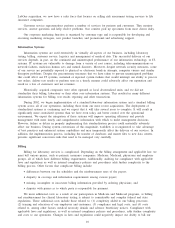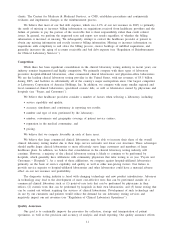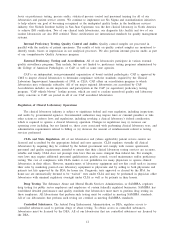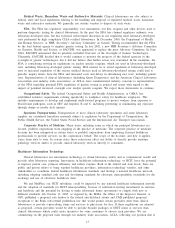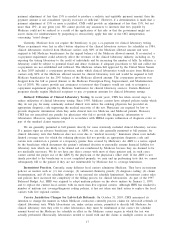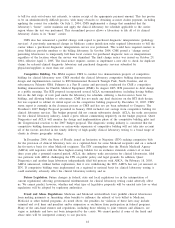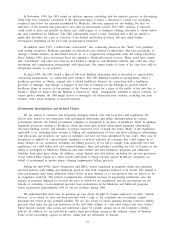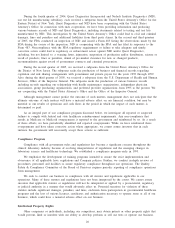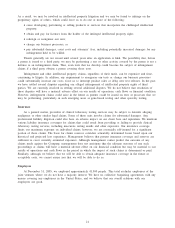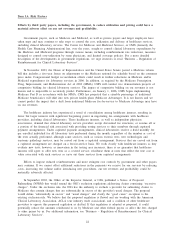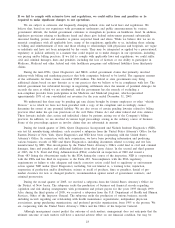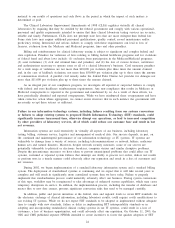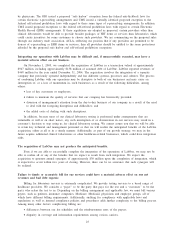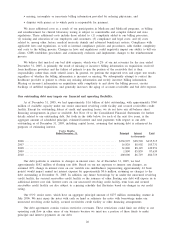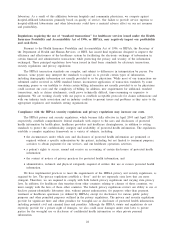Quest Diagnostics 2005 Annual Report Download - page 36
Download and view the complete annual report
Please find page 36 of the 2005 Quest Diagnostics annual report below. You can navigate through the pages in the report by either clicking on the pages listed below, or by using the keyword search tool below to find specific information within the annual report.In November 1999, the OIG issued an advisory opinion concluding that the industry practice of discounting
client bills may constitute a kickback if the discounted price is below a laboratory’s overall cost (including
overhead) and below the amounts reimbursed by Medicare. Advisory opinions are not binding but may be
indicative of the position that prosecutors may take in enforcement actions. The OIG’s opinion, if enforced,
could result in fines and possible exclusion and could require us to eliminate offering discounts to clients below
the rates reimbursed by Medicare. The OIG subsequently issued a letter clarifying that it did not intend to
imply that discounts are a per se violation of the federal anti-kickback statute, but may merit further
investigation depending on the facts and circumstances presented.
In addition, since 1992, a federal anti-“self-referral’’ law, commonly known as the “Stark’’ law, prohibits,
with certain exceptions, Medicare payments for laboratory tests referred by physicians who have personally, or
through a family member, an investment interest in, or a compensation arrangement with, the testing laboratory.
Since January 1995, these restrictions have also applied to Medicaid-covered services. Many states have similar
anti-“self-referral’’ and other laws that are not limited to Medicare and Medicaid referrals and could also affect
investment and compensation arrangements with physicians. We cannot predict if some of the state laws will be
interpreted contrary to our practices.
In April 2003, the OIG issued a Special Advisory Bulletin addressing what it described as “questionable
contractual arrangements’’ in contractual joint ventures. The OIG Bulletin focused on arrangements where a
healthcare provider, or Owner, expands into a related healthcare business by contracting with a healthcare
provider, or Manager, that already is engaged in that line of business for the Manager to provide related
healthcare items or services to the patients of the Owner in return for a share of the profits of the new line of
business. While we believe that the Bulletin is directed at “sham’’ arrangements intended to induce referrals, we
cannot predict whether the OIG might choose to investigate all contractual joint ventures, including our joint
ventures with various hospitals or hospital systems.
Government Investigations and Related Claims
We are subject to extensive and frequently changing federal, state and local laws and regulations. We
believe that, based on our experience with government settlements and public announcements by various
government officials, the federal government continues to strengthen its position on healthcare fraud. In addition,
legislative provisions relating to healthcare fraud and abuse give federal enforcement personnel substantially
increased funding, powers and remedies to pursue suspected cases of fraud and abuse. Many of the regulations
applicable to us, including those relating to billing and reimbursement of tests and those relating to relationships
with physicians and hospitals, are vague or indefinite and have not been interpreted by the courts. They may be
interpreted or applied by a prosecutorial, regulatory or judicial authority in a manner that could require us to
make changes in our operations, including our billing practices. If we fail to comply with applicable laws and
regulations, we could suffer civil and criminal damages, fines and penalties, including the loss of licenses or our
ability to participate in Medicare, Medicaid and other federal and state healthcare programs and additional
liabilities from third party claims. In addition, certain federal and state statues, including the qui tam provisions
of the federal False Claim Act, allow private individuals to bring lawsuits against healthcare companies on
behalf of government or private payers alleging inappropriate billing practices.
During the mid-1990s, Quest Diagnostics and SBCL settled significant government claims that primarily
involved industry-wide billing and marketing practices that both companies believed to be lawful. The federal or
state governments may bring additional claims based on new theories as to our practices that we believe to be
in compliance with law. The federal government has substantial leverage in negotiating settlements since the
amount of potential damages far exceeds the rates at which we are reimbursed, and the government has the
remedy of excluding a non-compliant provider from participation in the Medicare and Medicaid programs,
which represented approximately 18% of our net revenues during 2005.
We understand that there may be pending qui tam claims brought by former employees or other “whistle
blowers’’ as to which we have not been provided with a copy of the complaint and accordingly cannot
determine the extent of any potential liability. We are also aware of certain pending lawsuits related to billing
practices filed under the qui tam provisions of the civil False Claims Act and other federal and state statutes.
These lawsuits include class action and individual claims by patients arising out of the Company’s billing
policies. In addition, we are involved in various legal proceedings arising in the ordinary course of business.
Some of the proceedings against us involve claims that are substantial in amount.
19



